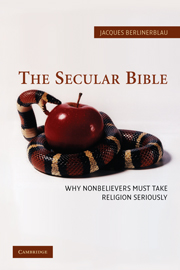Book contents
- Frontmatter
- Contents
- Preface and Acknowledgments
- Introduction: Secularists and the Not Godless World
- PART ONE THE COMPOSITION OF THE HEBREW BIBLE
- PART TWO THE INTERPRETERS OF THE HEBREW BIBLE
- PART THREE POLITICS AND SCRIPTURE
- 6 On Jewish Intermarriage: The Bible Is Open to Interpretation
- 7 Same-Sex Eroticism and Jerry Falwell
- 8 The Secular Qur'ān?
- Conclusion: Beyond Church and State: New Directions for Secularism
- Notes
- Index of Biblical Citations
- Index of Qur'ānic Citations
- Index of Rabbinic, Early Jewish, and Patristic Citations
- Index
6 - On Jewish Intermarriage: The Bible Is Open to Interpretation
Published online by Cambridge University Press: 05 June 2012
- Frontmatter
- Contents
- Preface and Acknowledgments
- Introduction: Secularists and the Not Godless World
- PART ONE THE COMPOSITION OF THE HEBREW BIBLE
- PART TWO THE INTERPRETERS OF THE HEBREW BIBLE
- PART THREE POLITICS AND SCRIPTURE
- 6 On Jewish Intermarriage: The Bible Is Open to Interpretation
- 7 Same-Sex Eroticism and Jerry Falwell
- 8 The Secular Qur'ān?
- Conclusion: Beyond Church and State: New Directions for Secularism
- Notes
- Index of Biblical Citations
- Index of Qur'ānic Citations
- Index of Rabbinic, Early Jewish, and Patristic Citations
- Index
Summary
Rabbi Ishmael taught: ‘He who marries a gentile woman and raises up children from her, raises up enemies against God.’
P. Megillah, 4:10Just as oil will not mix with other liquids, so Israel does not mix with the other nations of the world, as it is written [in Deuteronomy 7:3]: Neither shalt thou make marriages with them.
Midrash Rabbah, The Song of Songs, I. 3, 2In mainstream Judaism, the Judaism established by the Rabbinic sages of the first through sixth centuries AD, the following has been prohibited for millennia: any marriage in which one partner is Jewish and one partner is not. Aware, undoubtedly, that some Jews were not beyond flouting decrees from on high, the Rabbis also tackled the question of children born to Jewish/gentile parents. After much back and forth, a fateful (and to some, utterly inscrutable) decision was rendered. The offspring of a Jewish woman and a non-Jewish man was accorded the status of a Jew. Conversely, the child of a Jewish male and a gentile female was deemed a gentile. It was as a result of these deliberations that the prohibition on intermarriage and the principal of matrilineal descent (i.e., basing a child's identity on that of the mother) were soon to become integral and lasting features of normative Judaism.
The Hebrew Bible, whose various texts predate the aformentioned Talmudic decrees by centuries, thinks differently, so to speak, about these issues.
- Type
- Chapter
- Information
- The Secular BibleWhy Nonbelievers Must Take Religion Seriously, pp. 87 - 100Publisher: Cambridge University PressPrint publication year: 2005



